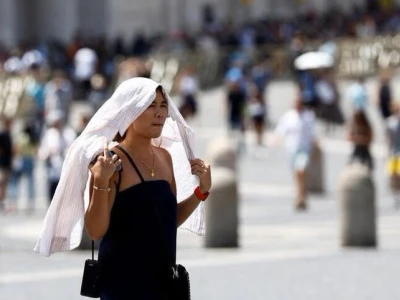
From L.A. to Minneapolis, U.S. bashed by severe winter storms
Experts say the growing frequency and intensity of such storms, interspersed with extreme heat and dry spells, are symptoms of climate change.
CHICAGO, Feb 23 (Reuters) - A deadly monster U.S. winter storm kept its grip on the Northern Plains and Upper Midwest on Thursday, delivering heavy snows, freezing rains and gusty winds while leaving hundreds of thousands without power and grounding hundreds of flights.
The broad swath of the northern United States - from Washington state to New England - remained under winter weather advisories. Some spots may see another 18 inches (46 cm) of snow, winds clocking in at 50 miles (80 km) per hour and wind chills equivalent to minus 40 degrees Fahrenheit (minus 40 C) throughout the day, the National Weather Service said.
At the same time, parts of the Ohio Valley and the South could see near record-breaking high temperatures, beginning Thursday and continuing over the next few days. On Sunday, it's expected to hit 88 F (31 C) in Jacksonville, Florida.
In Wisconsin, Michigan, Illinois, Indiana and New York, high winds and freezing rains left some 900,000 homes and businesses without power on Thursday morning, according to Poweroutage.us.
Near hard-hit hard-hit Grand Rapids, Michigan, a firefighter died in an incident involving a power line downed by ice, local officials said on Twitter.
The storm delayed or canceled more than 1,300 flights across the nation, according to Flightware.com. And authorities warned that drivers would face treacherous road conditions.
"Travel on the roads can be dangerous with just a trace of ice. But we're seeing ice caking from a quarter to half inch," said Richard Bann, of the weather service's Weather Prediction Center in College Park, Maryland. "That can be practically impossible."
In Ann Arbor, Michigan, home of the University of Michigan, almost 20,000 homes and businesses lost power. Nathan Pietryga, manager of the long-standing college hangout Pizza Bob's, counted himself one of the lucky ones.
"I made it to work, a little shuffling on the ice," he said.
Classes at the university weren't canceled, but students were advised to use discretion. Pietryga indicated he expected to sell some pizza. "We've been here forever, the kids will come in," he said.
A separate storm spawned unusual weather in California, where much of the state was under high wind and winter storm warnings.
Rare winter flurries were reported in San Francisco while blizzard conditions were expected in high elevations - even in the Los Angeles area. By Saturday, up to 8 feet (2.4 meters) of snow could accumulate on Mount Baldy, about 45 miles (72 km)east of Los Angeles in the San Gabriel Mountains.
"Snow is on the way and a lot. We are doing our best to brace for it in order to be ready for some powtastic days at SoCal's raddest mountain," Mt Baldy Resort said in a tweet, announcing it was closed on Thursday.
Experts say the growing frequency and intensity of such storms, interspersed with extreme heat and dry spells, are symptoms of climate change. While the East Coast has experienced a relatively mild winter, the Northern Plains has experienced an extreme one in terms of snowfall and low temperatures, according to the weather service.
On Thursday morning, snow was falling at a rate of 1 to 2 inches an hour in Minneapolis, a Midwestern city in a metropolitan area that is home to about 2.9 million people. New accumulations added to the 8 inches of snow already dumped by the storm.
Video footage and photographs on social media showed cars stuck on roadways, while streets and walkways were covered in drifting snow.
"Big-time flakes coming down here," storm chaser Aaron Jayjack said in a video he posted on Twitter from Minneapolis. "This is the final push of the storm, and in fact appears to be heaviest snowfall yet."
The Minneapolis school system was holding classes remotely for more than 29,000 pupils for the rest of the week. Dozens of school districts also canceled classes in North and South Dakota, Colorado, Michigan and Wyoming.




